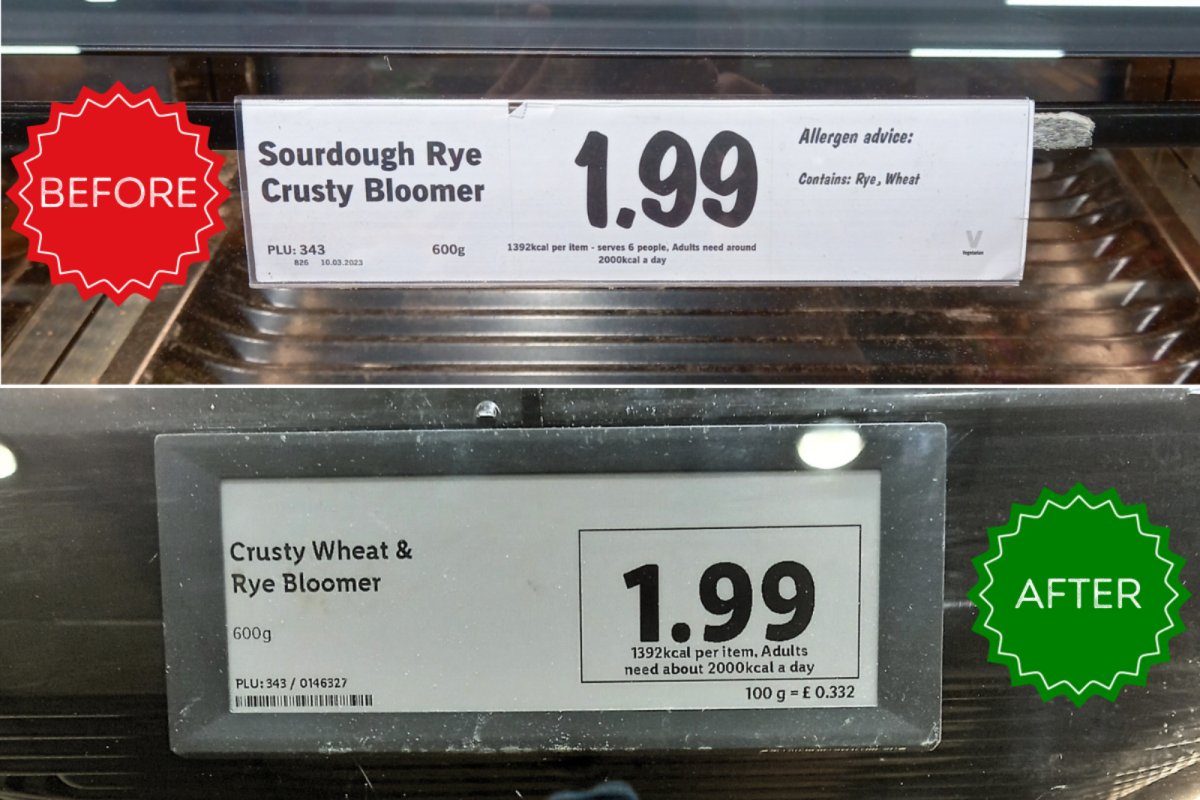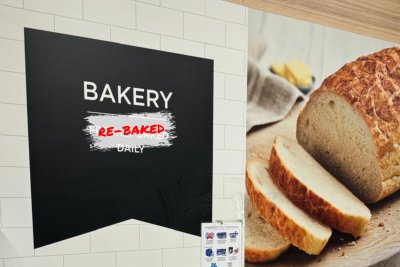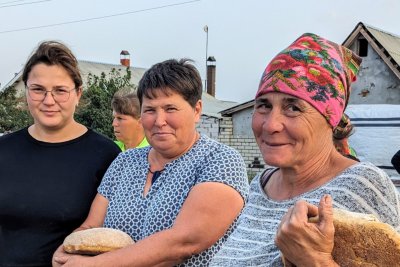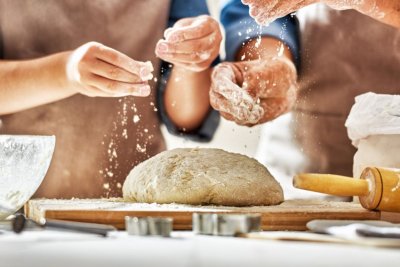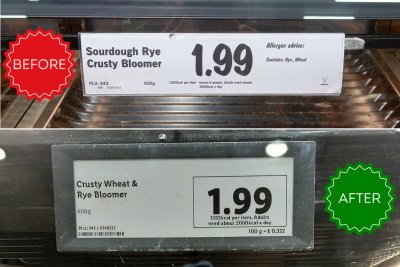 Mainly wheat, made with baker's yeast. Credit: Chris Young / www.realbreadcampaign.org CC-BY-SA-4.0
Mainly wheat, made with baker's yeast. Credit: Chris Young / www.realbreadcampaign.org CC-BY-SA-4.0
As the result of a complaint by the Real Bread Campaign, on 1 December 2023 a trading standards officer advised: 'Lidl have taken the comments on board and are changing the name of their "Sourdough crusty rye bloomer" to "Crusty Wheat & Rye Bloomer".'
Real Bread Campaign coordinator Chris Young said: 'We’re thankful that Lidl has come up with a more appropriate name for the product but we shouldn’t have to be spending our time on individual cases like this. Whichever party forms the next government, we urge them to introduce our proposed Honest Crust Act of improved composition, labelling and marketing standards.'
He added: 'In the meantime, we urge all bakeries and retailers to adopt the measures voluntarily, including displaying full ingredients lists of unwrapped products at point of sale, so shoppers can make better-informed buying choices.'
Case history
The Campaign’s complaint was prompted by a Lidl customer, who had obtained the confession that a product the company marketed as ‘sourdough rye’ was in fact made mainly from wheat flour (56%), with baker’s yeast added to speed the rising process. Nowhere in store or on the company’s did Lidl declare these important facts to shoppers.
Lidl rejected the customer’s complaint so, on 31 May 2023, the Real Bread Campaign took action. The company rejected this second complaint and, after further correspondence broke down, on 20 September the Campaign complained to the trading standards department of London Borough of Bexley, which has a Primary Authority relationship with Lidl.
(LB Bexley then advised that they would not accept the complaint direct from the Campaign, but that we would have to raise it with our own local authority to refer back to Bexley, which we did.)
LB Bexley rejected the Campaign’s complaint about Lidl’s ‘baked for you throughout the day’ and related claims on the grounds that ‘the bread is clearly baked in store.’ This is despite the fact that Lidl makes nothing in store: all items in the unwrapped baked products section are made elsewhere and (in the case of loaves) merely re-baked in store.
Governmental guidance from the Food Standards Agency states: ‘Terms such as “freshly baked”, “baked in store” and “oven fresh” may mislead consumers into believing that they are being offered products that have been freshly produced on site from basic raw materials. Some stores sell bread made from part-baked products that have been packed in an inert atmosphere or frozen off-site then “baked off” at in-store bakeries. Use of terms like “freshly baked”, “baked in store” and “oven fresh” on these products could potentially infringe the general legal provisions [ on food law, labelling and consumer protection.]
Meanwhile…
Having been snubbed by Lidl, the customer wrote to the Advertising Standards Authority, which also rejected the complaint. In response to the customer challenging the decision, on 27 November 2023 the ASA operations manager for complaints wrote:
'I have considered the details thoroughly but agree with the decision made by [my colleague] that there was no breach of our rules for the reasons he explained.
In particular, [my colleague] pointed out that there was a previous ASA ruling for another company’s ad which identified that there was no fixed legal definition of sourdough bread in the UK and that because the bread contained a sufficient amount of sourdough to distinguish it from non-sourdough products, the reference to sourdough was acceptable. The ASA Council had also noted that although the bread may contain a small amount of commercial yeast, that was not uncommon in commercially produced sourdough bread, and would not affect the average consumer’s perception of the bread as sourdough. In addition, you refer to wheat flour being contained within Lidl’s bread, but for the reasons above, and because sourdough breads may consist of different flours alongside the sourdough starter, there is no breach. I also agree with Adam’s decision on the “in store bakery” claim.
I appreciate the ingredients of the product did not align with your expectations for a sourdough product, but given we have already investigated and ruled on the matter, we will not be taking any further action.'
Chris Young said: 'The fact that the ASA’s decision was different to the outcome of our trading standards complaint once again underlines the need for the Honest Crust Act we’ve been calling for since 2009. Too much still relies on opinion and interpretation, with cases like this taking weeks, months and even more than a year to resolve. Clear-cut definitions and regulation would make things some much simpler for shoppers, business owners and consumer protection bodies.'
The Campaign has now written to the ASA and trading standards (see below) to challenge elements of their respective decisions.
Updates
15 December 2023: We followed up with LB Bexley (via LB Tower Hamlets), asking when we can expect a reply to the email we sent on 4 December.
13 December 2023: The ASA replied: 'In response to your request, we will not be reviewing our decision on case reference A23-1208097 as you did not submit the original complaint and therefore our service complaints procedure is not available to you. However, we note that the bread product you referenced does not currently appear on any marketing within our remit in any case.
We have also spoken to Bexley [trading standards department], who were referenced in some of the press articles. We understand from them that they did not ask Lidl to make changes to the name of the bread product, instead they had only contacted Lidl to seek their comments after you contacted them and Lidl then decided to make that change themselves. Bexley TSD confirmed that they had not made a decision as to whether the name of the product was problematic.
We will therefore not be taking any further action in relation to this specific complaint.'
5 December 2023: The ASA replied: 'We are considering the points you raise, and will respond in full when we are in a position to do so.'
4 December 2023: We wrote to the ASA: 'Details of a complaint (ref A23-1208097) about Lidl’s advertising of its ‘sourdough crusty rye bloomer’ have been passed to us. We cannot agree with the ASA’s decision about the advertising, which we believe breaches the CAP Code on truthfulness and substantiation.
Rather than being rye bread, the advertised product is mainly (56%) made from wheat flour. The presence of wheat is only mentioned in passing on the product webpage in the form of an allergen declaration, which in no way makes clear that it is the main ingredient. Similarly, Lidl not giving a quantitative ingredient declaration anywhere means that shoppers would not know that the product only contains a mere 6% rye flour, plus whatever amount is in the 12% starter – so perhaps a total of 12% rye flour.
Rather than an ingredient, sourdough is a process. Would the ASA reject a complaint about a bottle of spirit being advertised as Scotch whisky on the grounds that it ‘contained a sufficient amount of Scotch whisky’ or about a jar of syrup being advertised as honey because it ‘contained a sufficient amount of honey’? In both cases, the product would have to be made by the appropriate process. The same applies to sourdough bread, the process of making which does not involve the use of baker’s yeast.
With regard to the time, means and place of production, the ASA’s rejection of this element of the customer’s complaint rested on your belief that ‘the claims on the website are unlikely to mislead, because they don’t claim the bread is entirely made in-store, but merely freshly baked before being put out for sale.’ Lidl’s claims in no way make clear that the latter has taken place, rather than what the majority of people are likely to understand them to mean.
Nowhere are the claims qualified by a statement of the facts - that the product was made elsewhere at some point in the past and only re-baked in store. As such, we believe Lidl is in breach of not only the CAP Code but also governmental guidance from the Food Standards Agency on this type of claim. The FSA states: ‘Terms such as “freshly baked”, “baked in store” and “oven fresh” may mislead consumers into believing that they are being offered products that have been freshly produced on site from basic raw materials. Some stores sell bread made from part-baked products that have been packed in an inert atmosphere or frozen off-site then “baked off” at in-store bakeries. Use of terms like “freshly baked”, “baked in store” and “oven fresh” on these products could potentially infringe [food law, labelling and consumer protection.]’
The truth is important as re-baking in what we call loaf tanning salons:
- doesn’t support skilled bakery jobs in the store’s local community.
- uses around twice as much energy as a product that is baked once.
- results in products that tend to stale more quickly and so are more likely to be discarded, to the detriment of the shopper and the environment.
As the product is not rye bread, is not genuine sourdough, and its advertising appears to breach FSA guidance, we look forward to the ASA reviewing and revising its decision on all three elements of the complaint.'
We also wrote to LB Tower Hamlets:
'Thank you for this. It is good to see that Lidl has chosen a more appropriate name for the product.
With regard to the time, means and place of production, all unwrapped items in the Lidl baked products section are made elsewhere at some point in the past and merely re-baked in store. Lidl in no way makes it clear that this is the case, rather than what the majority of people are likely to understand the company’s marketing terms/claims to mean.
As such, we believe Lidl is in breach of governmental guidance from the Food Standards Agency. This states: ‘Terms such as “freshly baked”, “baked in store” and “oven fresh” may mislead consumers into believing that they are being offered products that have been freshly produced on site from basic raw materials. Some stores sell bread made from part-baked products that have been packed in an inert atmosphere or frozen off-site then “baked off” at in-store bakeries. Use of terms like “freshly baked”, “baked in store” and “oven fresh” on these products could potentially infringe [food law, labelling and consumer protection.]’
The truth is important as re-baking in what we call loaf tanning salons:
- doesn’t support skilled bakery jobs in the store’s local community.
- uses around twice as much energy as a product that is baked once.
- results in products that tend to stale more quickly and so are more likely to be discarded, to the detriment of the shopper and the environment.
Please ask your colleagues at LB Bexley to review their decision on this element of our complaint.'
See also
Real Bread Campaign: The Real Bread Campaign finds and shares ways to make bread better for us, better for our communities and better for the planet. Whether your interest is local food, community-focussed small enterprises, honest labelling, therapeutic baking, or simply tasty toast, everyone is invited to become a Campaign supporter.
Sustain
The Green House
244-254 Cambridge Heath Road
London E2 9DA
020 3559 6777
sustain@sustainweb.org
Sustain advocates food and agriculture policies and practices that enhance the health and welfare of people and animals, improve the working and living environment, promote equity and enrich society and culture.
© Sustain 2024
Registered charity (no. 1018643)
Data privacy & cookies
Icons by Icons8
